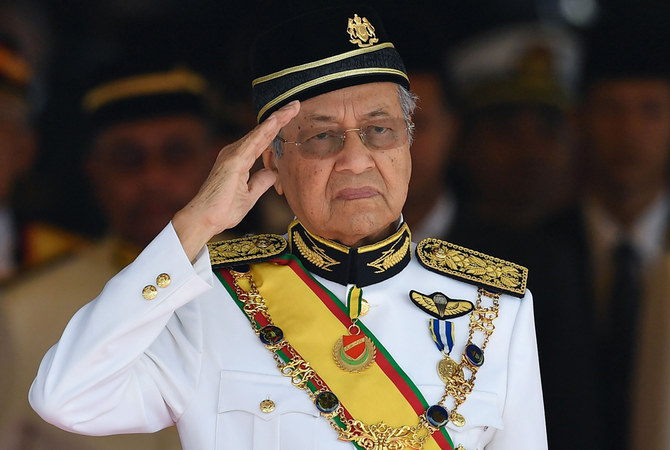KUALA LUMPUR: Malaysian Prime Minister Mahathir Mohamad, who resigned on Monday, will act as the country’s interim leader amid ongoing talks to form a new government coalition.
The king made the appointment on Monday.
“His Majesty has been pleased to appoint Mahathir Mohamad as the interim prime minister, pending the appointment of a new prime minister in accordance with Article 43 (2) (a) of the Federal Constitution,” Mohammed Zuki bin Ali, chief secretary to the Malaysian government, said in a statement.
The 94-year old leader would preside over the administration of the country until a new prime minister was chosen and a cabinet was formed, he added.
Mahatir also quit the Malaysian United Indigenous Party which he founded ahead of the 2018 general election, and the party announced it had left the ruling Pakatan Harapan (Alliance of Hope) coalition.
The development follows surprise weekend talks between some coalition members and opposition groups on forming a new cabinet that would exclude Mahathir’s anointed successor Anwar Ibrahim.
Anwar is a former opposition icon who was jailed for years on widely criticized sodomy charges. He had teamed up with his former nemesis Mahathir ahead of the 2018 elections to oust the government of Najib Razak, who had become embroiled in the massive 1MDB graft scandal.
Anwar said Sunday said he had been betrayed by coalition partners. Eleven members of parliament from his People’s Justice Party formed an independent bloc.
Opinion
This section contains relevant reference points, placed in (Opinion field)
“Everything is in the air now,” Prof. James Chin, a political analyst from the Asia Institute at Tasmania University, told Arab News. “Both sides are trying to persuade members of parliament to join their bloc as any coalition must have a majority of MPs to form a new government. Anwar must find additional MPs to cover this shortfall if he wants to stay in power.”
Anwar’s exclusion from any new coalition would end his hopes of becoming Malaysia’s prime minister any time soon.
There were concerns that the political upheaval would upset voters and see them disengage from future political processes.
“This is creating huge doubt in the Malaysian public, most people do not really know what is happening,” Sophie Lemiere, a fellow at Stanford University, told Arab News. “The information has been very contradictory, rumors have been going on for the past three days, these have created anxiety among people. Mahathir has made a double down poker game move to make a comeback with an even greater mandate by tendering his resignation.”
There are also worries that the ongoing maneuvers may lead to an intensification of racial politics in the multicultural country. In Malaysia over 60 percent of the population is Bumiputra (of Malay and indigenous ethnicity), around 22 percent is of Chinese descent and about seven percent is Indian.
“One of the dangers is the possibility of the new coalition being a fully Bumiputra government,” according to Kuala Lumpur-based think tank IMAN Research. “This will be disastrous for race relations.”





























